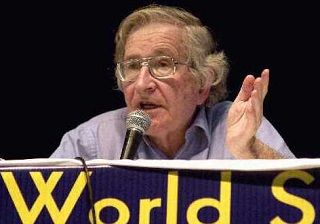Social Critic Noam Chomsky on Climate Change

In a recent conversation in which I attempted to introduce Chomsky to my extremely well-read but politically right-wing mother, as she and I walked the beautiful beaches of the Outer Banks of North Carolina, I told her, “Take me on my most critical day, add about 50 points of IQ, and you have Noam Chomsky.”
Please forgive this long introduction to an excerpt from Chomsky’s recent article: “How to Destroy a Planet Without Really Trying,” which I gladly reproduce here as follows:
In terms of both political parties, President Obama, the media, and the international press seem to be looking forward with great enthusiasm to what they call “a century of energy independence” for the United States. Energy independence is an almost meaningless concept, but put that aside. What they mean is: we’ll have a century in which to maximize the use of fossil fuels and contribute to destroying the world.
And that’s pretty much the case everywhere. Admittedly, when it comes to alternative energy development, Europe is doing something. Meanwhile, the United States, the richest and most powerful country in world history, is the only nation among perhaps 100 relevant ones that doesn’t have a national policy for restricting the use of fossil fuels, that doesn’t even have renewable energy targets. It’s not because the population doesn’t want it. Americans are pretty close to the international norm in their concern about global warming. It’s institutional structures that block change. Business interests don’t want it and they’re overwhelmingly powerful in determining policy, so you get a big gap between opinion and policy on lots of issues, including this one.
In other words, our problem in the U.S. is not our people – but you probably already knew that. Our problem is that the force of money and power has momentarily escaped the grasp of the people here. I say “momentarily,” because I see that Americans everywhere are awakening to the corrosive effects of Big Money and Big Politics, and I’m confident that the sensibilities of my countrymen will not allow this fine democracy …. (a) government of the people, by the people, for the people, (to) perish from the earth.
Our scientists tell us that we have a few short years left in which we can make a material difference in the outcome re: climate change. Perhaps you and I want to join together in that blink of an eye and make a difference. But will our voices prevail?
Why not remove the question? Let’s push it over the top, let’s tell our friends, and make sure it happens.
